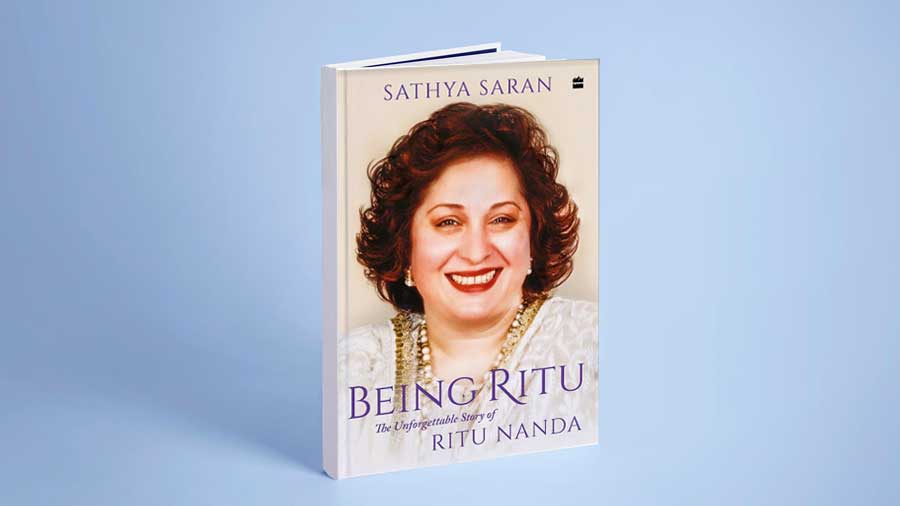I met Ritu Nanda in the last years of her life. She was putting together a book on her father Raj Kapoor and I was publishing it as an editor with a leading publishing house. She was battling cancer in its terminal stages but looking at her one wouldn’t know. In the year it took us to work on the book, she would often be required to travel to the US for treatment and the work would go on despite all the obstacles in the way.
I was witness to the sheer passion she brought to the endeavour every time I visited her at her Friends Colony bungalow of New Delhi. Her welcoming smile, her enthusiasm in going over each page of the book, and the delicious savouries she invariably served (a definitive Kapoor trait), made each interaction worth a thousand memories. And I will never forget the expression on her face as she escorted me to her puja room the day I carried the first copy of the book to her. It was verily a brave woman’s last stand – the book published on Raj Kapoor’s birthday in 2017. She passed away in 2020.
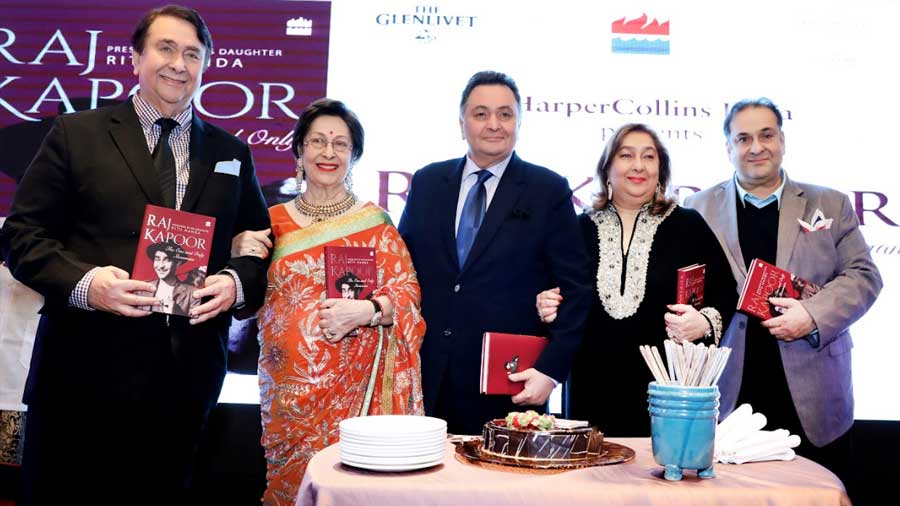
The Kapoor siblings at the launch of Ritu's book on her father Raj Kapoor's birthday: Randhir Kapoor, Ritu Nanda, Rishi Kapoor, Rima Jain and Rajiv Kapoor Courtesy: The Nanda family photo collection
Being Ritu: The Unforgettable Story of Ritu Nanda brings to light many aspects of this incredible woman who was more than just her father’s daughter or her husband’s wife. From setting up Niky Tasha, at a time when a ‘start-up’ – let alone one initiated by a woman – wasn’t an overused word in our business and economic jargon, to becoming a Guinness Book World Record holder as an LIC agent, Ritu Nanda was a visionary entrepreneur and woman with a mind of her own.
Mentioning how Niky Tasha came into being, author Sathya Saran writes, “…Ritu was cooking one evening, as she liked to do sometimes, when the gas ran out. ‘How wonderful if we could have an electric oven on standby in the same place,’” she mused. The cooking range which incorporated an oven grew from this incident. Combining the many aspects of cooking that included cooking multiple dishes with the fact that many urban Indian women were also venturing into making baked dishes for special occasions, or baking cakes, Ritu conceptualised the multi-appliance kitchenette that would combine multiple gas or electric burners with an oven. Besides its utility, it was aesthetically a conversation piece; something that demanded the kitchen be upgraded to accommodate its good looks and functions.
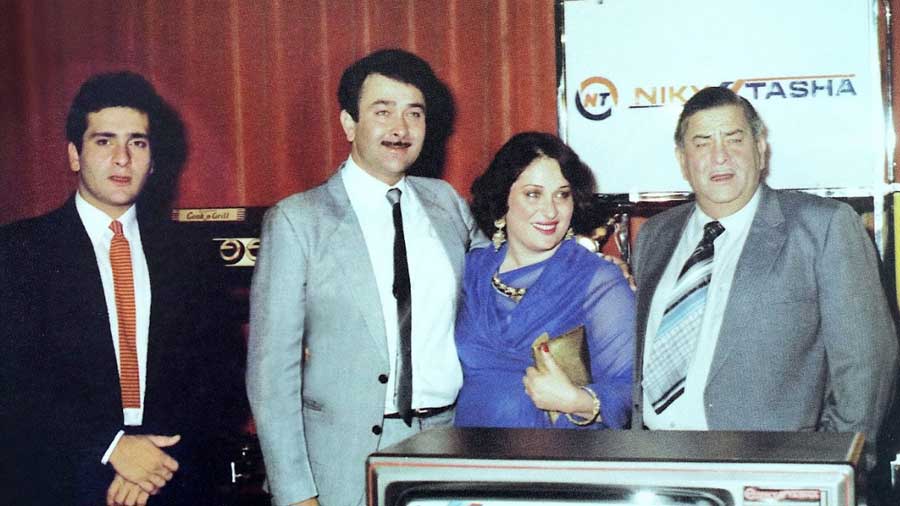
Rajiv Kapoor, Randhir Kapoor, Ritu Nanda and Raj Kapoor at a Niky Tasha event Courtesy: The Nanda family photo collection
Combining the names of her children, Nikhil and Nitasha, the doting mother named her new baby, Niky Tasha. Nikhil Nanda describes his mother’s enterprise as a “garage concept with people creating sketches to create the shape of the product,” that was started because “she wanted security for her children and herself too, independent of her husband’s company. It was a desire to also be able to provide for herself and her family. As a son, I see it as her desire to earn my father’s level of respect, and one way to do so was to earn it as a credible businesswoman.”
Sathya Saran’s previous works of non-fiction have all dealt with legends from the film and music world – Guru Dutt, SD Burman, Jagjit Singh, Hariprasad Chaurasia. With Being Ritu, she delves into the life and times of a remarkable woman who evolved her own identity distinct from her family’s to create a fascinating portrait of a woman of substance.
After a number of books on composers and singers, how did a book on Ritu Nanda come about?
Sathya Saran: I was informed that Ritu Nanda’s family would like me to write a book about their mother whom they had recently lost to cancer. The thought was that as someone who had worked closely in writing about women during my long tenure with Femina, I could possibly do justice to the project.
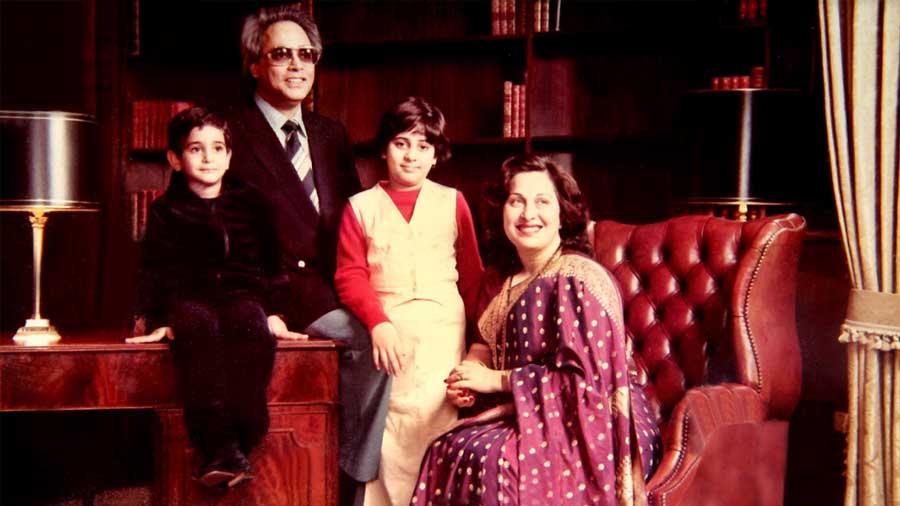
The Nanda family Courtesy: The Nanda family photo collection
Were you aware of her life and career before you embarked on the book or was this an opening into her world?
I knew she was Raj Kapoor’s daughter and married into an illustrious industry family. I knew about her Niky Tasha enterprise. I was curious. I had read about her prowess in selling insurance. My father was a senior official in LIC and there was a natural interest. But I never imagined how much more there was to know about her and learn.
In the absence of the subject, what did your preparation and research include?
I do realise how different the project would have been if I could have interacted with Ritu. I missed out on being able to experience her first-hand. But her daughter, Nitasha Nanda, put everything aside to help me get enough information and points of view, inputs, quotes and stories related to her mother’s life. I spent many sessions interviewing her and meeting Ritu’s siblings and talking to members of her extended family. The pandemic added a new problem but thanks to the complete cooperation of the family and friends, the interviews happened.
Nitasha’s team helped set up interviews in the US and Singapore as well. And despite it being a very private space, Nikhil Nanda allowed me to visit the farmhouse so I could get an idea of his mother’s aesthetic sense, as most of the decor had been her brainchild. Indeed, both Ritu’s children were frank and spoke in detail about incidents that were deeply personal as they were important windows to her personality.
Also important was the contribution of Ritu’s school and college friends. They brought an entire era alive. In fact, many of their stories came as a surprise to Nikhil and Nitasha when they read the manuscript.
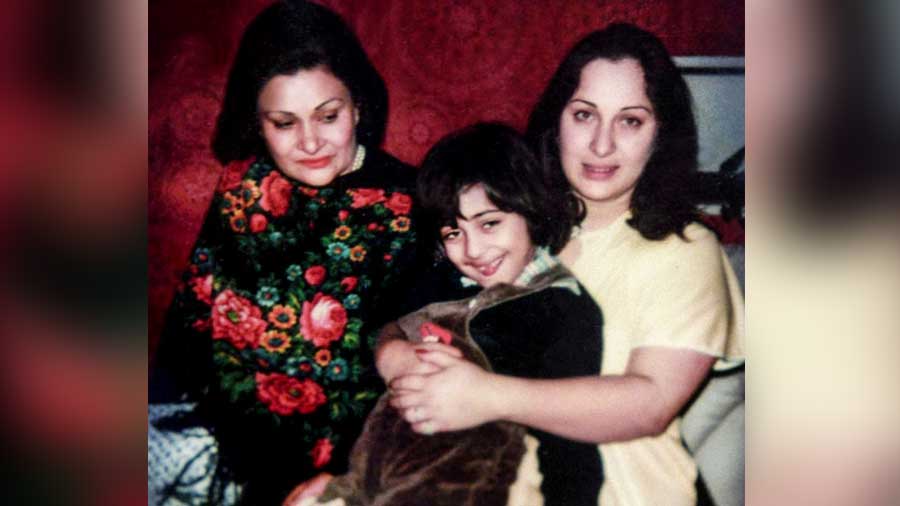
Krishna Kapoor and Ritu Nanda with Nitasha Nanda Courtesy: The Nanda family photo collection
What fascinated you the most?
Like every filmgoer I was fascinated by the glimpses into the life of the daughter of a famous icon. This was first-hand information! And in vivid detail. The details on her nature, shared by Nitin Mukesh, the glimpses of Raj Kapoor he provided as a friend of his own father (the singer Mukesh), or as a father to Ritu fascinated me.
What aspects, according to you, make her a pioneer?
For every woman… the way she remained so feminine yet steered her life successfully to include a career, enterprise, social outreaches. How she was wife, daughter-in-law, hostess, mother and businesswoman all at the same time. She started Niky Tasha with no formal training. Yet her idea was revolutionary in that it changed the middle-class kitchen from a smoky, uncomfortable space to something modern and efficient to work in. Her idea of combining an oven with a cooking range was completely new to middle-class Indian homes.
And she promoted her brand like she had an MBA! Her ad campaigns on TV, her demo stations… she thought of everything and was hands-on. And the brand expanded to include washing machines and TV sets. Things we take for granted today but were hardly seen at the time except in the homes of the much-travelled super-rich.
Then, when she was down and out and decided to become an agent for LIC, she took the idea beyond any agent’s route of action. Selling policies that fed the needs of the policy holder… not one size fits all… to become worthy of an entry into the Guinness Book of World Records for the maximum policies sold in a single day! The insurance training institutes she set up, the health insurance systems are still running like well-oiled wheels.
I think her pursuit of excellence in all she took up is my biggest takeaway.
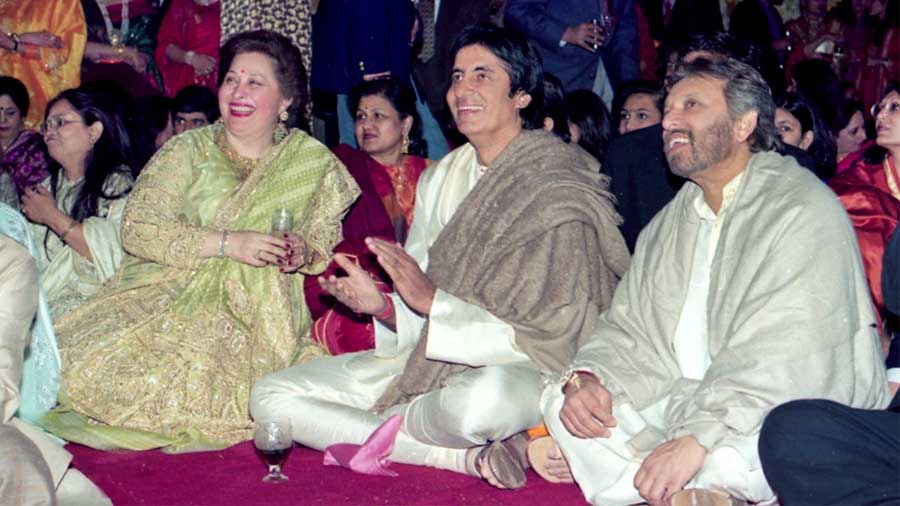
Amitabh Bachchan with Ritu, at the sangeet ceremony of Nikhil’s wedding to Shweta Courtesy: The Nanda family photo collection
She fought cancer bravely in the last years even while putting together a book on her father… could you give the readers a glimpse of that period?
She took up the project in desperation as no one else was available and she had a deadline. She had never tried writing a book before. But she did it. Found a way. And went on to publish two more updated versions… working on the last one from her hospital room in Sloan Kettering. She learnt to use the computer to be able to manage this transatlantic feat. She would work before dawn and before the nurses and doctors came to swamp her with their treatment routines.
Shantanu Ray Chaudhuri is a publisher, editor and critic. He has worked with leading Indian authors and books commissioned by him have won the National Award for Best Book on Cinema and the MAMI award for best writing on cinema. An avid film buff, he loves poetry and music.
